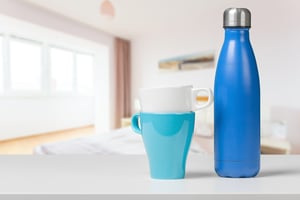Starbucks is getting rid of plastic straws. McDonald’s, too. But what about the hospitality industry?
Hotel chains, cruise lines and tour companies have lagged behind in efforts to eliminate plastic straws and other single-use plastics. But that’s changing, as major players like Marriott and Royal Caribbean are seeking out new ways to phase out these environmental hazards. Practically speaking, how difficult is it to make this change? And does it really make a difference?
Why have plastic straws and bottles become the villains?
We all learned in elementary school that plastic can take up to 1,000 years to break down and decompose. Only recently, however, have the monumental costs of our reliance on plastic — particularly single-use plastics — become an urgent worldwide concern.
In a vortex of ocean currents floats the Great Pacific Garbage Patch, estimated to contain 1.8 trillion plastic pieces — that’s equivalent to 250 pieces for every human in the world. And that’s just one visible manifestation of the problem. Plastic trash breaks down into small particles, which poison the sea animals that consume them.
Straws and plastic water bottles are two items targeted by environmentalists because they’re ubiquitous, disposable and, for the most part, unnecessary. Americans alone use millions of straws every day and 50 billion — yes, billion — plastic water bottles per year. Only a fraction of these bottles are recycled. Straws are too lightweight to be processed in mechanical recycling sorters, and as a result often blow away and end up in the sea.
Water bottle and straw bans in the hospitality industry
The hospitality industry is uniquely positioned to make an impact by eliminating plastic straws and water bottles — and to benefit from doing so. Why? First, the numbers are big. Anantara and AVANI, both luxury hotel chains owned by Minor Hotels, estimate their Asian hotels used nearly 2.5 million straws in 2017. In January 2018, they stopped using plastic straws. Multinational hotel company AccorHotels used 4.2 million straws in the U.S. and Canada in 2017 — and stopped using them in June 2018.
Second: It’s not just the marine ecosystem at stake, but also the tourism ecosystem. “People go on a cruise to see beautiful islands, clear waters and gorgeous beaches. These companies have a direct stake in keeping these places pristine,” Clark Mitchell, a former editor at Travel & Leisure and now a director at the conservation-focused Band Foundation, tells The New York Times. “And yet single-use plastic, like straws, are literally everywhere a traveler looks, in the drinks being sold, in the water and on the beach.”
Strategies for cutting straws and other plastics
Begin with a by-request-only policy. Unsure about guests’ reaction to the sudden absence of straws? Ease into it by giving straws only when asked. Royal Caribbean did just that in 2018, posting “Why No Straws?” signs onboard to inform passengers, then followed up with a total phaseout of plastic straws by early 2019. It’s important to have an option that works for kids and people with disabilities, however.
Test multiple alternatives to plastic straws. The obvious choice might be paper or compostable straws, but the best solution for your business may be more nuanced. Options include steel, silicone, borosilicate glass, bamboo and even rye stems. Give various alternatives a trial run. You may find, like Boka Restaurant Group Senior Operations Director Erin Phillips did, that some paper straws get soggy or impart an off-flavor to certain drinks, and that a durable, washable plastic straw — or no straw — is a better alternative. For smoothies (our area of expertise), consider extra-wide steel straws.
Think luxury, not deprivation. The Akyra Sukhumvit Bangkok hotel opened in 2018 as a property totally free of single-use plastics, and the result is stunning. Guests are given steel water bottles, bath products are stored in locally made pottery, and reusable bags are offered for guests to take shopping. Plastic doesn’t say “luxury,” but elegant, branded reusable bottles do, whether a chain offers them as an on-site amenity or as a gift to take home.
Expand plastic reduction efforts beyond bottles and straws. Straws are the villain of the moment, but food wrappers and containers make up a much greater fraction of plastic waste: 31.1 percent in 2017. Royal Caribbean is conducting a full audit of plastics use, including condiment packets, cups, and bags, that will guide a plan to be completed in 2020. In the hotel business, single-use shampoo bottles are a target. Marriott and many other chains are rolling out wall-mounted dispensers to replace them.
Make plastic reduction efforts part of a larger sustainability strategy — and track results. For instance, AccorHotels’ straw ban doesn’t stand alone; it’s part of the chain’s five-year program that also includes a 30 percent reduction in food waste and adding 1,000 urban vegetable gardens. Duke University’s Plastic Pollution Coalition recommends hotels first create initial baseline waste inventories, then collect data on current plastic usage, conduct an annual analysis, and build a larger sustainability position.
How are you making your hotel or restaurant business more sustainable? Tell us about it and we may showcase your company in a future post.


